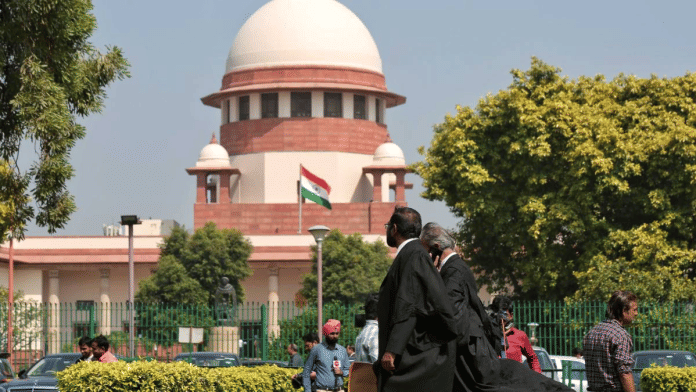New Delhi: The Centre is yet to appoint nine of the 37 candidates the Supreme Court recommended for elevation to various high courts last month. It had previously raised concerns over these nine names.
The collegium had cleared the names despite the government’s concerns, overruling its inputs. However, instead of returning the file to the collegium with further inputs on these candidates, if any, the Union Ministry of Law and Justice has held them back, while appointing those to whom it had given a go-ahead.
On Tuesday, a bench led by Justice Sanjay Kishan Kaul criticised the government for “selectively picking” candidates while appointing judges, saying it disturbs the seniority fixed by the collegium. This is not the first time the bench has criticised the government for following a “pick and choose” policy in appointing judges.
According to the bench, there are 14 names that have been overlooked by the government. While nine are from the latest batch approved in October, five are from older recommendations.
The bench, also comprising Justice Sudhanshu Dhulia, was hearing a petition filed by the Advocates’ Association, Bengaluru, and another by an NGO, the Centre for Public Interest Litigation (CPIL). The petitions were seeking contempt of court proceedings against the Centre for its alleged delay in deciding on collegium recommendations in the matter of appointment and transfer of judges.
During the hearing, the bench also pointed to transfer proposals made by the collegium. There are 11 such recommendations awaiting a final government notification.
Appointments to the high courts are made under the Memorandum of Procedure (MoP) which gives primacy to the top court’s collegium in judicial appointments. According to the mechanism outlined, the state high court sends two sets of proposals — one to the government and the other to the Supreme Court collegium. The latter can hold deliberations on the names only after the Centre forwards the names to the collegium, along with intelligence inputs on the backgrounds of the candidates.
The collegium is empowered to brush aside the central government’s objections and has the final say in the appointments. On its part, the government can send a proposal back to the collegium for reconsideration. However, if the collegium reiterates its stand, the government is bound to make the appointments.
In the case of the 14 names pending with the government, the latter has neither notified them nor returned the files to the collegium for reconsideration. Rather, it has gone ahead and appointed the others recommended alongside these names.
Most of those who have been held back figured higher in the list, so if appointed, they would have been senior to those whose names were separated from the list and appointed.
The practice of segregating and appointing first those who were in a junior position in the list has come under criticism from the judiciary several times, sources in the top court told ThePrint. However, the government has not addressed the issue.
Also read: Can Right to Know & Right to Privacy co-exist? Electoral bonds case reopens debate
Govt vs SC collegium
Of the nine names, the collegium had cleared two on 10 October and seven on 17 October.
According to the resolutions uploaded on the SC website, the top court collegium had, on 10 October, cleared 17 proposals, of which 13 related to the promotion of judicial officers to their respective state high courts.
While the Centre notified 11 names on 18 October, it held back the files of two judicial officers from Kerala — M.B. Snehalatha and P. Krishna Kumar. It had expressed reservations over both the names. With regard to Snehalatha, it highlighted criticism she faced regarding two bail orders given by her, while for Krishna Kumar, it said he had spent only 10 years as a judicial officer. Though he had the requisite qualifying service to be consideration for promotion, he was superseding other judicial officers.
However, the collegium brushed aside the government’s concerns in the case of both. Regarding Snehalatha, it felt that the government’s observation should not come in the way of her elevation.
Then, on 17 October, the collegium passed resolutions favouring 20 candidates for appointments to five HCs, of whom seven were judicial officers and the rest were lawyers. A fortnight later, on 2 November, the Centre notified 13 appointments, while holding back the names of two out of four lawyers cleared for Madhya Pradesh, two out of five for Punjab and Haryana and one of two for the Gauhati High Court. Two names proposed for Uttarakhand, too, await government clearance.
The collegium resolution concerning one of the two lawyers from MP — Ashish Shroti — had brushed aside Centre’s “general observations” on his legal acumen and observed that “it is for the judiciary to assess” a candidate. With regard to the second lawyer, Amit Seth, the resolution did not mention any government objections vis-à-vis his candidature.
In the case of Punjab and Haryana, the collegium resolution brushed aside “vague” inputs on advocate Deepinder Singh Nalwa’s “financial integrity,” saying there was nothing on record to substantiate the adverse inputs. As for advocate Harmeet Singh Grewal, the resolution noted that two of the three consultee judges from the Supreme Court gave a positive opinion, while the third offered none.
With regard to the two lawyers from Uttarakhand, Siddhartha Sah and Alok Mahra, the government had reservations. In the case of Mahra, this was over his professional competence. The collegium dismissed these apprehensions, observing it is for the judiciary to assess the professional competence of lawyers.
Out of the two lawyers recommended for the Gauhati High Court, the government is yet to process the name of N. Unni Krishnan Nair. In his case, the government had made adverse observations, although it also put on record a report saying there was nothing adverse against his integrity. The collegium said this should not come in the way of the recommendation.
(Edited by Smriti Sinha)






